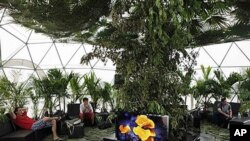Global warming and how human activity contributes to it are front and center here.
Representatives from more than 190 nations are attending the United Nations Climate Change Conference in the Mexican resort of Cancun. They're trying to reach accords on a number of issues but are leaving a comprehensive, legally binding agreement for next year. Environmental activists from non-governmental organizations also are there, pushing for action to curb greenhouse gas emissions that contribute to global warming. Many believe there is little time to lose.
As conference delegates meet elsewhere, author Bill McKibben makes the rounds in the hotel lobbies, talking about the need for action now. In his best-selling book"EAARTH," McKibben argues that an eight-tenths-of-one-percent rise in temperature already has changed the planet irreversibly and that catastrophe awaits if it goes much higher.
"The arctic is melting quickly, Russia caught on fire this summer, Pakistan drowned (in floods), the ocean is 30 percent more acid than it used to be," said McKibben. "We are in tough shape with less than a degree of temperature increase."
McKibben said the threat is confirmed, continually, by scientific data, yet world leaders have yet to produce an effective plan to meet the challenge. "The scientific method has worked pretty well. The political method has not worked at all."
While delegates debate possible agreements, however, many people around the world, on their own, have developed plans to reduce emissions. Even private companies are contributing ideas.
Google is here with a large version of Google Earth that allows people to visit various parts of the world to check on the effects of climate change. Google representative Raleigh Seamster said a tribe in Brazil put its forest online to gain international support. "Now that these partners have their forest visualized on Google Earth, they can use this to create a Google Earth tour that explains why the forest is important," said Seamster. "They can show it to people, they can demo it to decision makers and they can also create YouTube videos."
The Internet also was key in drawing hundreds of young people from around the world to join a coalition called Youngo. They keep in touch by email and social media, and they came here to push for action.
Jeremy Osborn from New York City said his generation sees what needs to be done to curb climate change. "Young people are probably making those connections more easily because they have been brought up with the issue and with the science, much more so than older generations, but everyone is beginning to get on board""
One Youngo member who came here is Logaswari from Singapore. She said she connected with other young activists online and is now here with them, meeting with delegates and decision makers. "Over here, you are able to talk to the person. You get to meet everybody and you can work in a more relaxed manner because you can go out for coffee. It is a lot more efficient, really."
These young people hope their activism eventually will bring about change that could prevent the worst consequences of global warming.











